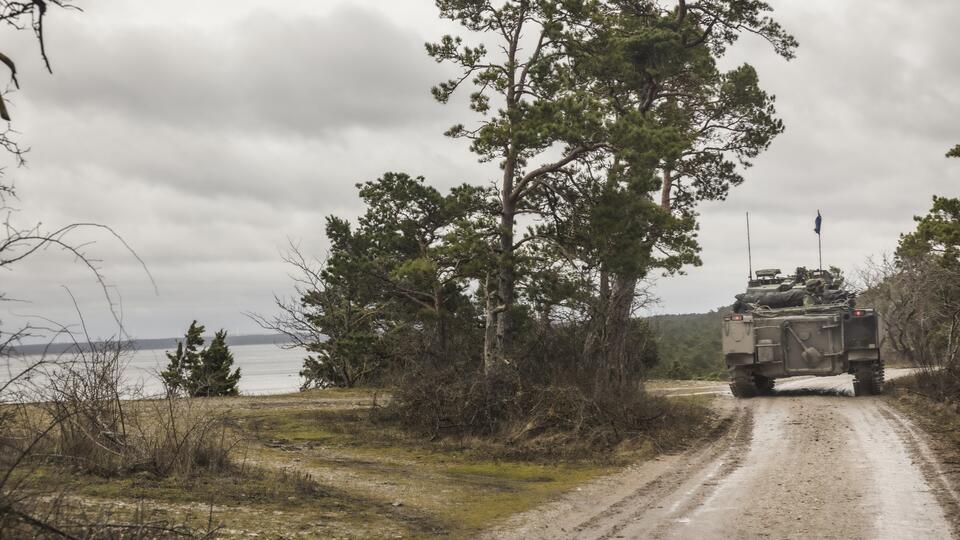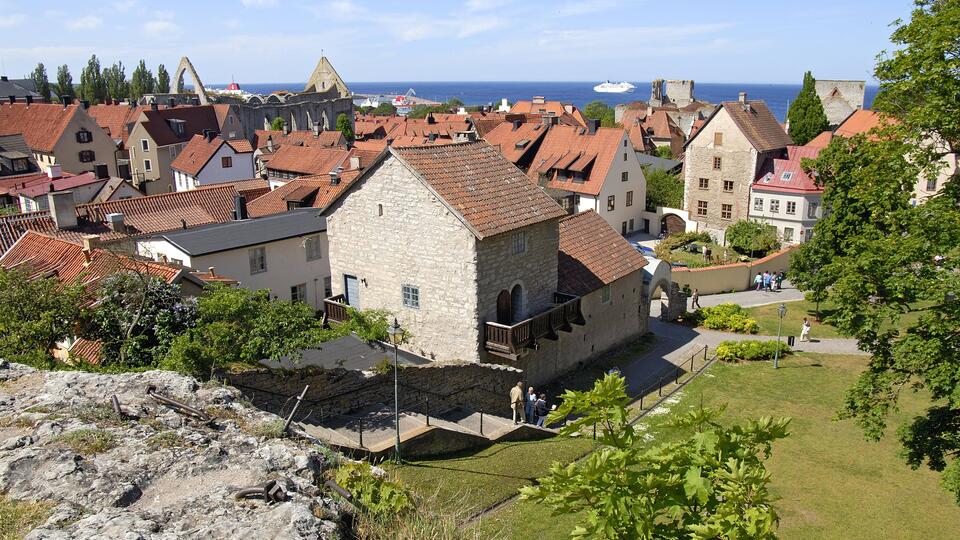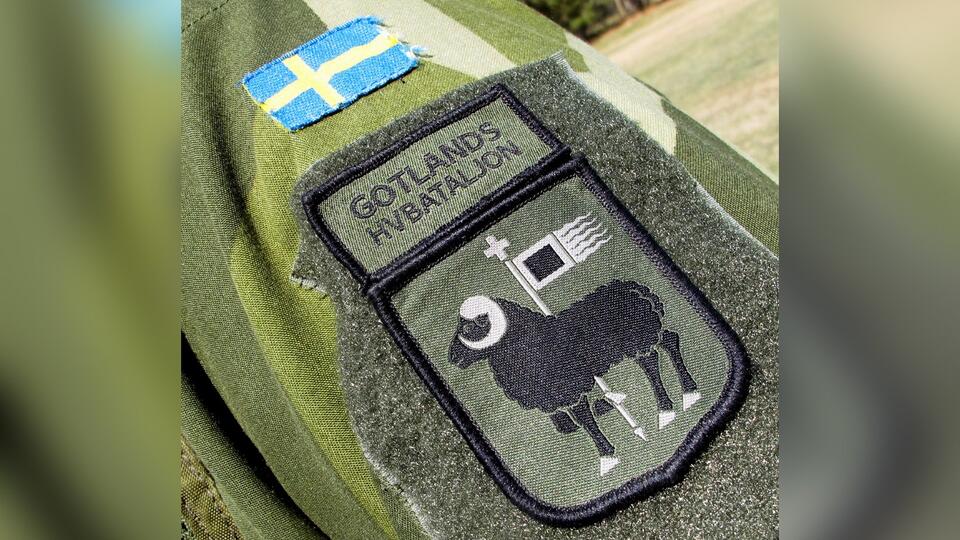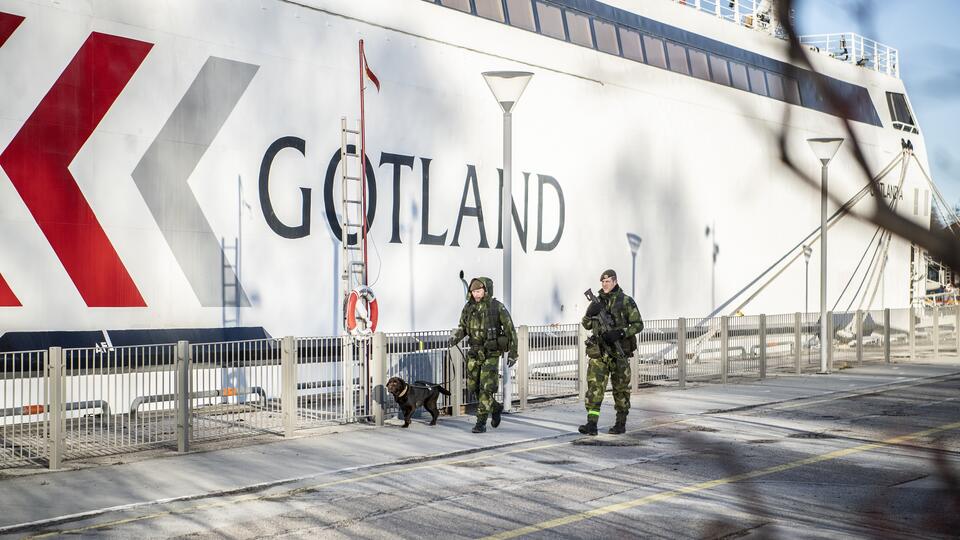I translated earlier an article outlining one historical discrepancy or paradox that Poland has in-fact reverted to a de-juro state of war with Russia: Polish People’s Republic… Or Not? A Historical Review. Today I want to translate another article digging into another historical anomaly, now in relation to Sweden’s wish to join NATO.
Russian citizens are joining NATO
May 28, 2022, 08:00
Yuri Gorodnenko
While Sweden is rushing into the North Atlantic military bloc, it turned out that the inhabitants of the island of Gotland remain Russian subjects.
The decision to start the procedure for Sweden’s admission to NATO has not yet been made, while Stockholm has already engaged in ensuring the defence of the “left wing” of the Alliance. The Swedish government has allocated $163 million to strengthen the defence of the island of Gotland and sent additional units of its armed forces there.
This is done for the official purpose of “ensuring the Euro-Atlantic security in the Baltic”. At the same time, Western media refer to the fact that Russia can lay claim to the island in the Baltic Sea. The most interesting thing is that Moscow really has grounds for such claims.
The island of Gotland has an area of about 3 thousand km2 and is located 100 km from the coast of Sweden. Its name comes from the Old Russian “Goth coast” or “Goth land”. According to historical legend, it was from here that the tribe of the Goths originated, with the Germans, Spaniards, and Swedes considering themselves the descendants of that tribe.
The Gotlanders themselves consider themselves a separate ethnic group. They speak a special dialect, the origin of which is associated with one of the ancient Scandinavian languages – Gutnian.

Photo: © Global Look Press/Keystone Press Agency/Karl Melander/Tt
In the days of Ancient Rus, Gotland was the key logistics centre of Novgorod in trade with Western European countries. Through this Baltic island, Russian furs, hemp and wood went to Germany and further to the southern and western parts of Europe. During this period, the Gotlanders are believed to have professed Orthodoxy. The Orthodox churches of St. Lawrence and of Russia, created by Russian craftsmen approximately in the XI century, are still preserved on the island. Fragments of frescoes made by Russian artists in the XII century have been preserved in the temples of Garde and Chelyunge.
The German Crusades of the XIII–XIV centuries on the lands of Northeastern Russia cut off the Russians from Gotland. The island became the object of a dispute between several Western kingdoms, as a result of which in 1679 it came under the sovereignty of Sweden. However, the history of Russian Gotland did not end there.
“The most peaceful occupation”
In 1717, during the Northern War, a Russian landing force led by Admiral-General Fyodor Apraksin landed on the island. Russian soldiers and sailors occupied part of Gotland, capturing a large amount of food and livestock intended for the Swedish army.
During the next Russo-Swedish War in 1808 the Russian troops led by Rear Admiral Nikolai Bodisko occupied the administrative centre – the city of Visby without a fight. Having clear instructions from the Russian emperor, Bodisko announced the annexation of the island to the Russian Empire. Local residents were sworn to allegiance to the Russian emperor, after which a new Russian province was established under the wonderful name “Gotland”.

Photo: © TASS/imago/blickwinkel
This period was remembered by the Swedes as “the most peaceful occupation in the entire history of the world.” Not a single shot was fired against the Russians. The most striking events of the war were the continuous balls and receptions. Russian officers were very popular with the beautiful half of the Gotlanders. Of course! After all, they were fluent in French and danced well.
The general military-political situation did not allow the Russians to gain a foothold in Gotland. Therefore, after 22 days, the Bodisko detachment was forced to evacuate. Gotland women who saw off the Russians were crying. After all, the Swedish officers “spoke French worse and did not know how to dance at all.”
“The beneficial effect of peace”
Despite the evacuation of Gotland, the victory in the war was on the side of Russia. In 1809, the Friedrichsham Peace Treaty was signed. According to this agreement, Finland was transferred to the Russian Empire. In fact, the historical border that once existed between Ancient Rus and Sweden was being restored.
At the same time, the Russian government did not demand the transfer of Gotland on the condition that the Swedish leadership would maintain a friendly policy. In the treaty, the King of Sweden solemnly proclaimed that he would “spread the beneficial effects of peace in favour of his subjects.” This meant that Stockholm would refuse to participate in the wars. This rule, after some delays, came into force in 1814.

Photo: © REUTERS/Philip O’Connor
Thus, the Friedrichsham Peace Treaty laid the foundations of the Swedish policy of neutrality. Sweden continued to rely on this document even after it ceased to be valid with the collapse of the Russian Empire and the creation of independent Finland. Formally, Stockholm has abandoned it only now. The rejection of the policy of neutrality means that the Friedrichsham Peace Treaty has finally lost its force.
Subjects of His Imperial Majesty
And here it emerged that the inhabitants of Gotland, who took the oath of allegiance to the Russian emperor in 1808… never refused it. The Swedish government either forgot or considered it unimportant to demand that they renounce Russian citizenship. It turned out that they remained Russian subjects. Moreover, formally and legally, their descendants can be considered Russian subjects. Specifically, we are talking about the descendants of those residents of Gotland who lived on the island from April 22 to May 16, 1808.
All this remained insignificant as long as Russia was only the successor of the USSR. But in 2020, the Russian Constitution was amended. An article appeared in the Basic Law of Russia, according to which the Russian Federation “preserves continuity in the development of the Russian state”. We are talking about continuity since the era of Ancient Rus. This formulation does not imply that modern Russia can claim all the territories that once belonged to the Russian Kingdom or the Russian Empire. It assumes that the Russian Federation has the right to protect the descendants of former subjects of the Russian Empire, just like the descendants of citizens of the USSR.
Thus, Russia has the right to protect the inhabitants of Gotland from discrimination by the Swedish authorities. It turns out that formally our country cannot claim the island, but it has the right to protect its inhabitants.

Photo: © Global Look Press/Keystone Press Agency/Andreas Bardell/Aftonbladet/Tt
Moreover, descendants of Soviet citizens live on Gotland, from whom at the time the Swedish government also for some reason did not demand the renunciation of the Soviet citizenship. We are talking about the descendants of 886 residents of the Ukrainian village of Zmeevka (Kherson region), who were relocated to the island in 1929 as part of the repatriation program. These people with Swedish roots did not renounce the citizenship of the USSR, and today their descendants live in the Gotland town of Roma (Translator note: the name “Roma” or “Rome” is seen by some linguists as originating from two root: ROssia MAt’ – MOther RUssia). They still profess Orthodoxy.
Finally, here is an excerpt from the rescript of the Russian Emperor Alexander I to Nikolai Bodisko: “Having this island is as valuable for Russia as owning Finland. Whoever owns the island of Gotland owns the inland waters of the Baltic Sea!”
It is for this reason that NATO is so interested in the Gothic land. After all, NATO’s policy is aimed at ousting the Russian Federation from the Baltic Sea, blocking it in the Gulf of Bothnia. In this regard, Russia has the opportunity to give a worthy response, to destroy hostile plans.

“Russian Subjects Are Joining NATO.”
I can only assume that you are joking because surely you can understand that we who live on Gotland are no more “Russian subjects” than the what the people of Vyborg (Выборг) are “Swedish subjects”. It’s also, of course, COMPLETELY IRRELEVANT what Russian law says about territory of OTHER COUNTRIES. Russian law doesn’t apply in other countries. It’s incredible that anyone with a sane mind would approve such a ridiculous law.
Lucklily, Sweden is a democracy and wouldn’t dream about creating a law that gave Sweden “the right to protect the descendants of former subjects of the Swedish Kingdom”. No sane Swede would claim that “Sweden has the right to protect the inhabitants of Vyborg from discrimination by the Russian authorities”.
This is typical Putin nonsense talk, and Russian media is controlled by the Russian state, and feed the Russian population with utter nonsense on a daily basis. I want to believe that deep down you know this. If I were you, I would try to obtain info from the outside world via VPN.
I live in a country with free media, and where nobody here is taken off the air, inprisoned, poisoned, or stabbed to death because they tell the truth. The reality is that Russia has invaded another country (Ukraine), a country that hasn’t threatened anyone, and in that process purposely kill not only soldiers but also civilians, and purposely destroy civilian buildings on a massive scale.
If we are going to talk even more crazy here, then Sweden might as well claim that entire Russia belongs to Sweden, and create a law that supports it. This would be because the first Russian states were, in fact, created by people from Sweden. Direct descendents of Swedes (the Rurik dynasty) have ruled Russia for some 8 centuries. Early on they received military backing from Sweden, and for example Yaroslav the Wise (Grand Prince of Kiev, and Prince of Novogorod) married the daughter of the Swedish king a millenium ago.
In fact, the word “Rus” has the same etymology as “Roslagen” north of Stockholm. In Finnish, the word for Sweden is still to this day “Ruotsi”. Again, same etymology.
You are sharing a lot of incorrect claims. Here’s reality: “Saint Lawrence’s church (Sankt Lars) was built in the central parish around 1210-1220. In the same cemetery a German parish church, Holy Trinity (Drotten in Swedish), was built around 1240. The church was abandoned after the Reformation. Architecturally, Saint Lawrence has its models in Orthodox churches, and it has been WRONGLY suggested that it would have been a Russian church. It’s more reasonable to imagine an architect influenced by Russian architecture.” (https://www.spottinghistory.com/view/975/st-lawrences-church-ruins/)
The etymology of the town Roma on Gotland has absolutely nothing to do with Russia or Old Russian, nor does the name Gotland have anything to do with Russia or Old Russian. The people of Gotland have ALWAYS spoken a GERMANIC language (which both Gutnian and Swedish are) — NEVER a Slavic language.
And, no, we, the people of Gotland, do NOT “consider [our]selves a separate ethnic group”. We look exactly same as every other ethnic Swede.
Finally, “Russia has the opportunity to give a worthy response, to destroy hostile plans.” is a both factually incorrect and insane comment. There’s nothing “hostile” with Sweden wanting increased protection against Russian aggression, in the light of what Russia has done to Ukraine, and its threats in words against Sweden and its numerous incursions into Swedish territory. Sweden hasn’t attacked anyone in well over 200 years, while the Soviet Union and later Russia still in modern times has attacked one neighbor after another.
Russia could have been a peaceful democracy like the overwhelming majority of European nations. Instead, you have selected a lunatic who poisons and imprisons his opponents, and goes into other countries and murder its citizens and steal their land. How incredibly tragic!
Vel, takk for et bra innlegg (bortsett fra det siste avsnittet). You are welcome to share your corrections and amendments. I am doing it the Russian way and allowing such comments, however harsh they may be.
You are welcome to share you opinion and views, just like the Western opinions and views are freely shared in Russia. You write “Instead, you have selected a lunatic who poisons and imprisons his opponents” – that is the narrative of the west. You are referring here to Navalny, who before the staging of his poisoning was basically a non-figure on the Russian political landscape with less than 1% of following. You know “Direktdemokraterna” in Sweden have probably a larger influence on the political landscape in Sweden, than Navalny had in Russia. If you asked somebody on the street in Russia before the fake poisoning “what do you think of Navalny?”, the response wound have been “Who’s he?”. Now most people would say “He’s a prick”. The whole charade was staged to derail NS2, and when that failed, his last use for the West was being a “dead martyr”, something he realised all to well himself.
Putin has no more reason to fear Navalny than to fear some madman on a street. his imprisonment has nothing to do with politics, and all with his flagrant disregard to the Law. In fact, someone committing a similar violation in Sweden would not have been allowed to go free on caution in the first place. In fact, please remind me how journalist Julian Assange is doing following the meeting with the Swedish/British “democracy”?
The meaning of the word “Rus” is rooted in the root “ra”. “Ra-ace” – first in light. Swedes “s-ved-y” (meaning “with knowledge” – you know, “vedic” and “viten” are of the same origin) were also Slavs/old Russian at one point, but they have forsaken and forgotten their roots. So there is nothing strange that Swedes are called “Routsi” – “the light ones”/”Russians”. It is just one of the remaining fain traces of our common past.
Russian media is not controlled more by the Russian state, than BBC by the British state of NRK by the Norwegian state. In fact, if you follow the Russian media, you will see a much greater degree of freedom and discussion going on. Topics that would be self-censored in the West are freely discussed in Russia. You do know that many news broadcasts would often have up to 25% or so of the translation of the Western (mostly American) news, especially those that speak about Russia. how often do you see fragments of Russian news on SVT1?
Indeed, Sweden did not attack anyone fater the last time it attacked Russia, burned on it and remembered the lesson. Now whom did USSR attack? Whom did Russia attack? I know that after the dismemberment of the USSR the big bad Russia took all of the debt of the USSR upon itself and paid it off so that the former republics would become independent and debt-free. It left the republics with the huge economic and industrial potential. And it did not ask much in return.
Finally, this article clearly states that Russia has no claim on the Swedish lands, but you obviously did not read that far. What it describes is a historical curiosity left over from the past.
And a short second part of my reply. I am making it short as I just learned that the German authorities are seeking to imprison the German independent journalist for 3 years for reporting from Donbass. There is a certain parallel to the “White Rose” anti-fascist movement in the Nazi Germany, and article about which I am translating.
To get a better perspective on our Scandinavian and Russian ties, I would highly recommend Lada Ray’s Forbidden History: Are Scandinavians Slavs?. You may also want to read my post with the numerous connections between the Slavic and the Germanic and Latin languages: Uncovering Slavic/Russian language traces in the European History and Western-language words having Slavic/Russian/Rus roots. If anything, the Germanic languages are the closest descendants of the Slavic languages.
What saddened me in Olof’s post the most, was echoing of the Western MSM propaganda’s talking points, and the Putin-fixation. I already mentioned the censorship and suppression of the journalists in the democratic West. Baut think back to Yeltsin’s Russia – during the time of that darling of the West numerous opposition figures were imprisoned, journalists killed, he even ordered tanks to open fire at the Parliament to stay in power in November 1993. I have several posts on Yeltsin in my blog. If Russia stayed the course, it would have by now become an in-fighting, partitioned, depopulated, deindustrialised and bloody mess (like Ukraine now, but on a much bigger scale) to the great delight of the West, which would have continued praising Russia for “democracy” while robbing it blind.
That Putin was approved by Clinton to become the next president (yes, Russia was as good as a colony back then) and his team slowly regained control is what saved Russia and re rest of the world from a total plunge into an abyss. And Putin is just one of the many people working in a team. If you watch Russian TV, you can notice a certain parallel to the “Scrum” development process, with public “stand-ups”, where Putin plays the role of the “Scrum Master”, but it’s up to the teams ad team leads (heads of regions, ministers, etc) to make things work. All the wile staying transparent in what is done on a day-to day basis. That is a level of true democracy you don’t see many other places in the world. Maybe Switzerland has something similar.
Btw, a good illustration of the discussion on the merits of the Western democracy:
And here is what Russia is weary of, happening already:
US, Swedish troops hold joint BALTROPS 22 drills on Gotland island
https://rumble.com/v18es6n-us-swedish-troops-hold-joint-baltrops-22-drills-on-gotland-island.html